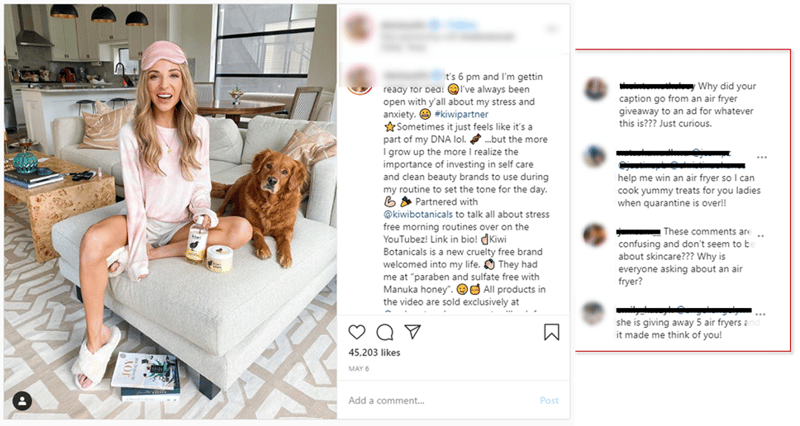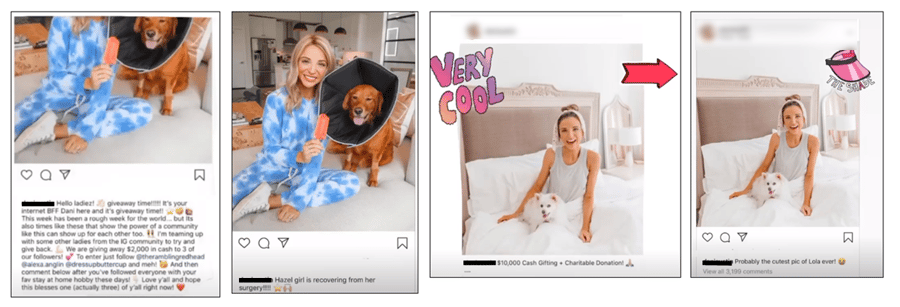The influencer marketing world is, unfortunately, no stranger to scams. Influencer fraud continues to be an issue and one that will keep evolving as long as brands keep hiring influencers based on vanity metrics.
I'm sure you can recall when the malpractice of fake followers had a bright light shone on it back in 2018. Keith Weed, the CMO for Unilever, called for more transparency in influencer marketing, and many marketers began to follow suit. Even the social networks did their part and removed fake accounts from their systems, followed by fake engagements and likes that were purchased by third-party apps.
Yet now, another influencer scam has begun to emerge, one that's worse than purchasing fake followers, likes, or engagements.
The Latest Influencer Scam
Giveaways are nothing new to the influencer marketing scene, but a few influencers have found a way to capitalize on these events and then double dip with fake results for their sponsored content. Specifically, some influencers are running cash giveaways, sometimes adding in a charitable donation to entice additional audiences to enter the giveaway. The post they share promoting the giveaway then racks up a massive amount of comments and likes from those attempting to win. After all the activity has been produced, they're changing the caption of the post to a sponsored post. Why? So they can go back to their brand sponsor and show all the great engagement they got!
How do we know this? If they're changing the copy afterwards, how can you tell the sponsored content engagements were falsified? Well, you get before and after shots, thanks to @influencerstruth.
As you can see from the screenshots above, this influencer ran product giveaways and cash giveaways, then change the captions of her content. And if that's not bad enough, here's the same influencer doing so on a sponsored piece of content. You can tell with a simple scroll through the comments section that the original post was about giving away five air fryers, and was then changed to a sponsored post for Kiwi Botanicals.

This may be one of the worst cases of influencer fraud our team has seen.
How This is Happening and How You Brand Can Avoid These Issues
We have to first stop and ask ourselves why this is happening in the first place.
The rise in influencers purchasing their followers came after brands continued to prioritize partnering with influencers who had large followings. They only looked for a big number, and never dug into the quality of those followers. The same thing is happening here as marketers shift to prioritize engagements as a metric of success. Since the platforms removed fake engagements, these influencers have found a new way to falsify this information.
So you can see, marketers really have two problems:
1. THOROUGHLY vetting influencers to avoid those conducting scams.
Avoiding these types of scams is easier than you think and comes down to how you vet your influencers. Too often marketers are relying on expensive tools to tell them information about an influencer instead of having a physical person manually review the profile. It's what we do for every single one of our clients with every influencer we partner with. Our team carefully combs through not one, but all of their social profiles and reviews everything from their organic posts, to sponsored posts, to comments, and especially Instagram Stories. While it may sound tedious, we put the safety of our clients first to ensure we never encounter something like the above.
2. preventing these issues from occurring in the first place
As we previously mentioned, it seems to be a trend that once so many marketers decide to focus on a single metric to measure success, influencers find ways to manipulate these metrics to make themselves the ideal candidate for a campaign. While the solution isn't simple, it means that we need to continue to look at influencer marketing holistically. No single metric can decide the success of a campaign, but rather a combination of many variables and factors that determine success.
At Carusele, we've created numerous proprietary algorithms to measure our influencer programs; from cStack (measuring content performance) to iStack (measuring influencer performance) to Engaged Audience Profiles and more. We even work with our clients to develop custom-attribution models to help track sales from influencer marketing campaigns.
So as you venture forward, be sure to ask your team what practices they have in place to ensure you're avoiding shady influencers as well as how you're planning to measure success. If you need help with any of those items, contact our team today or download our capabilities deck using the form below to learn more about our unique influencer marketing process.
-1.png?width=504&height=360&name=Carusele%20logo%20%C2%AE%20logo%20Color%20(2)-1.png)

.png?width=728&name=Blog%20Ads%20(4).png)